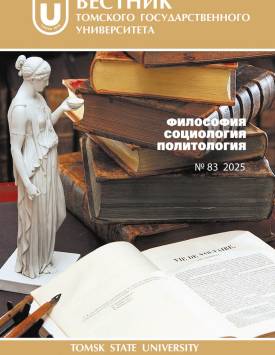Human identity in the context of digital transformation
A modern person living in the era of high technology not only uses the opportunities provided by the technological revolution to improve everyday routine, getting and exchanging information, but also strives to expand their physiological and cognitive abilities, while facing the problem of preserving the human nature. The article examines the processes of transformation of both social and personal identity of a person under the influence of new technologies and devices that mediate human activities and form new methods of communication. Taking into account the multilevel nature of the phenomenon of identity itself, as well as the fact that human being is a biosocial being, the authors analyze various interpretations of human identity. They note that the biological dimension can be considered as the “invariant core” of human identity, since the rejection of the biological, natural identity of a person leads to the loss of the human nature. Analyzing social identity, the authors address the concept “narrative identity” used by Paul Ricoeur and Alasdair MacIntyre, believing that the narrative concept “Self” is the most productive compared to others, primarily because it does not deny the role of the subject and also endows the latter with the right of “authorship”. The technological breakthrough and expansion of digital technologies in the era of the Fourth Industrial Revolution and the blurring of boundaries between the physical, biological and digital worlds noted by researchers have become the most important additional factor actualizing the topic of human extension. Digital challenges contributing to globalization processes transform traditional identity mechanisms; new dimensions of identity arise such as “network identity” and “personal identity”. The authors come to the conclusion that identity with all the multifaceted nature of this phenomenon should be understood as a specific point of support especially in the new digitalized world where the individual is in constant search of the balance between the real and the virtual. The authors declare no conflicts of interests.
Keywords
loneliness of agent,
communication,
digital transformation,
identityAuthors
| Chernikova Irina V. | Tomsk State University | iromashka@yandex.ru |
| Yakunina Irina V. | Tomsk State University | iromashka@yandex.ru |
Всего: 2
References
Соловьева Л.Н. Одиночество в "обществе всеобщей коммуникации": парадокс цифровой современности // Общество: философия, история, культура. 2023. № 7. С. 77-82.
Кузнецова Е.И., Пугачева Н.А. Прекаризация как феномен отчуждения субъекта в цифровой коммуникативной реальности // Общество: философия, история, культура. 2023. № 6. С. 36-41.
Лекторский В.А. Умер ли человек? // Человек. 2004. № 4. С. 10-16.
Чернавин Ю.А. Цифровая идентичность личности: сущность, особенности возникновения и проявления // Человеческий капитал. 2022. Т. 2, № 12 (168). С. 74-78.
Лепский В.Е. Актуальные социогуманитарные проблемы укрепления субъектности России // Проблемы цивилизационного развития. 2023. Т. 5, № 1. С. 28-46.
Ленк Х. Размышления о современной технике. М.: Аспект-пресс, 1996. 183 с.
Локк Дж. Сочинения: в 3 т. Т. 1: Опыт о человеческом разумении. М.: Мысль, 1985. 621 с.
Сартр Ж.-П. Экзистенциализм - это гуманизм. М.: Изд-во иностр. лит., 1953. 42 с.
Ницше Ф. Так говорил Заратустра. Книга для всех и ни для кого // Сочинения: в 2 т. М.: Мысль, 1990. Т. 2. 832 с.
Брюшинкин В.Н. Особенности исследования идентичности // Ценности и смыслы. 2010. № 5. С. 84-93.
Брубейкер Р., Купер Ф. За пределами идентичности // Мифы и заблуждения в изучении империи и национализма. М.: Новое изд-во, 2010. С. 131-192.
Брубейкер Р. Этничность без групп. М.: Изд. дом Высшей школы экономики, 2012. 408 с.
Думнова Э.М. Механизмы формирования идентичности в транзитивном обществе // Идеи и идеалы. 2015. Т. 2, № 2 (24). С. 104-111.
Холодковский К.Г. Российская идентичность - колеблющаяся идентичность // Идентичность как предмет политического анализа. М.: ИМЭМО РАН, 2011. С. 151 -154.
Труфанова Е.О. Человек в лабиринте идентичностей // Вопросы философии. 2010. № 2. С. 13-22.
Кутырев В.А. Последнее целование. Человек как традиция. СПб.: Алетейя, 2015. 312 с.
Шафоростов А.И. Онтологический аспект проблемы идентичности // Вестник ИрГТУ. 2011. № 8. С. 320-322.
Мамардашвили М.К. Как я понимаю философию. М.: Прогресс, Культура, 1992. 415 с.
Аршинов В.И., Гримов О.А., Чеклецов В.В. Киберанимизм: искусство быть живым в гибридном обществе // Философские проблемы информационных технологий и киберпространства. 2021. № 2 (20). С. 39-60.
Труфанова Е.О. К вопросу об исчезновении Я // Субъективный мир в контексте вызовов современных когнитивных наук. М.: Аквилон, 2017. С. 99-112.
Макинтайр А. После добродетели: Исследования теории морали. Москва: Академический Проект; Екатеринбург: Деловая книга, 2000. 384 с.
Тета Ж. - М. Нарративная идентичность как теория практической субъективности. К реконструкции концепции Поля Рикёра // Социологическое обозрение. 2012. Т. 2, № 2. С. 100-121.
Рикёр П. Конфликт интерпретаций. Очерк и о герменевтике М.: Академический Проект, 2008. 695 с.
Рикёр П. Память, история, забвение. М.: Изд-во гуманит. лит., 2004. 728 с.
Бауман З. Свобода. М.: Новое изд-во, 2021. 204 c.
Бауман З. Текучая современность. СПб.: Питер, 2008. 240 с.
Arbib M., Hesse M. The Construction of Reality. Cambridge, 1986. 286 р.
Гусейнов А.А. Философия как этический проект: тез. докл. // Вестник Российского философского общества. 2013. № 3. С. 11-16.
Эриксон Э. Идентичность: юность и кризис. М.: Флинта: МПСИ: Прогресс, 2006. 352 с.
Черникова И.В. Человек в эпоху технологических вызовов // Человек перед вызовами современной технологической революции. Томск: Изд-во Том. гос. ун-та. 2023. С.13-83.
Ларионова И.В. Формирование идентичности молодого поколения в контексте влияния информационно-сетевых технологий // Вестник экономики, права и социологии. 2017. № 4. С. 275-278.
Лисенкова А.А. Трансформация идентичности в цифровую эпоху // Вопросы философии. 2020. № 3. С. 65-74.

